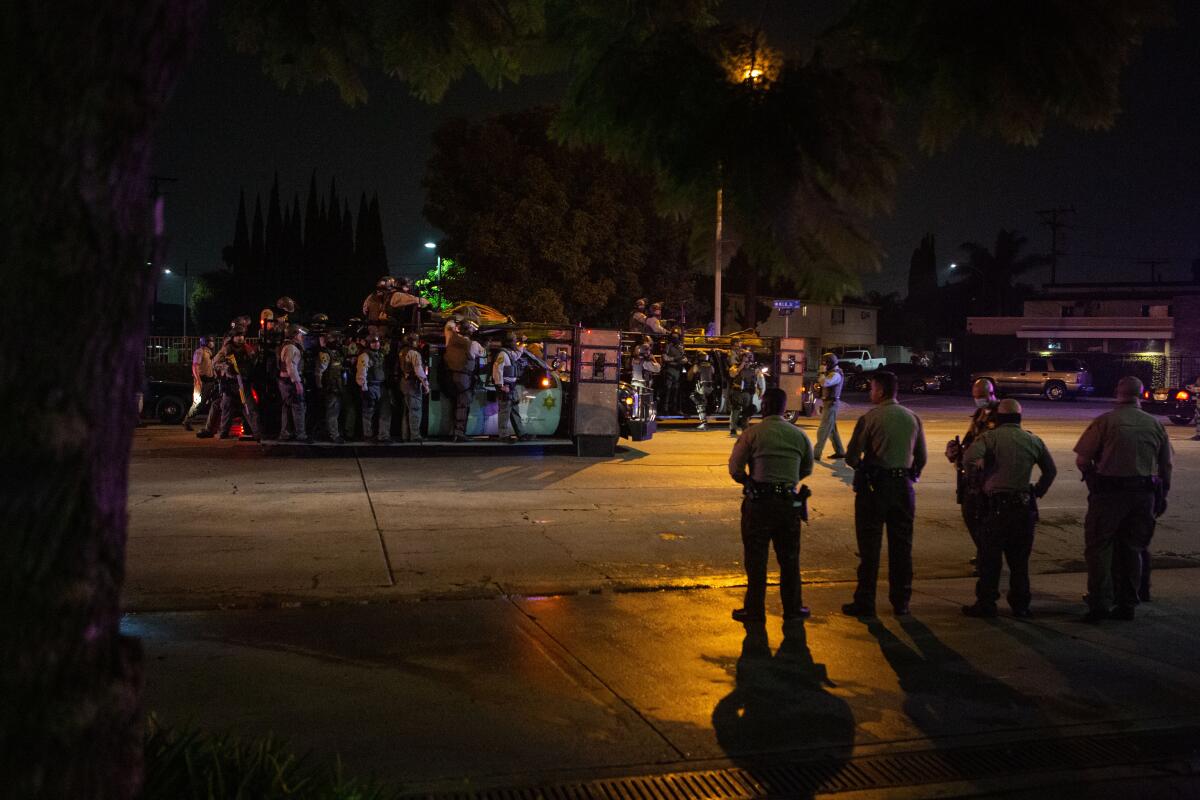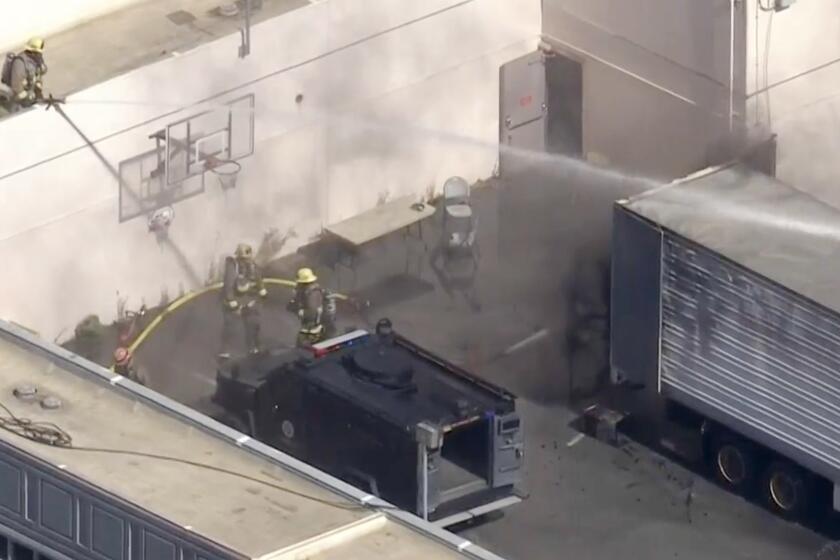L.A. County to pay $700,000 to radio reporter arrested while covering 2020 protest

Los Angeles County will pay $700,000 to a public radio journalist who was slammed to the ground and arrested by sheriff’s deputies while covering a 2020 protest outside a hospital in Lynwood.
During Tuesday’s meeting, the Board of Supervisors voted to approve the payment to LAist reporter Josie Huang in anticipation of a potential lawsuit, even though she had not yet formally filed her case in court. In a statement this week, Huang’s attorneys celebrated the outcome, which they said appears to be the largest dollar amount awarded to an individual reporter whose rights were violated while covering protests in 2020.
“This settlement sends a strong message and, importantly, holds officials accountable for what happened to our client,” said Katie Townsend, the Reporters Committee for Freedom of the Press attorney who represented Huang. “We’re glad to have reached a resolution with L.A. County that will not only provide our client redress, but also will help prevent future unlawful arrests of journalists.”
On Tuesday, the county deferred to the Sheriff’s Department for comment. Sheriff’s officials stressed that the incident was thoroughly investigated and that “appropriate administration action” was taken, without offering an explanation of what that entailed.
“We understand the role of the press during newsworthy events and make every effort to accommodate them with a designated press area and appropriate access,” spokeswoman Nicole Nishida wrote in an email.
The Sheriff’s Department’s handling of the September 2020 incident drew widespread condemnation from journalism organizations and politicians, particularly after Huang and others shared video footage that appeared to disprove allegations levied by department leaders. Ultimately, local prosecutors decided not to pursue charges, saying Huang was filming in a public area and not attempting to interfere with the deputies making an arrest nearby. This year, a judge declared her factually innocent.
The violent arrest took place on Sept. 12, 2020, hours after a gunman on a days-long rampage shot two sheriff’s deputies sitting in their cruiser near the Compton Metro station. Both deputies survived, but were rushed to the St. Francis Medical Center in Lynwood with serious injuries.
When a mobile shooting range caught fire in early October, it wasn’t the first time the Los Angeles County Sheriff’s Department suffered such an incident.
Initially, Huang went to the hospital that evening to cover a news conference on the deputies’ conditions. Afterward, she wrote on social media, she went to her car and called her editor. When she heard loud shouting outside the parking garage, she headed back out to investigate — with her press ID on a lanyard around her neck.
A small group of anti-police protesters had gathered outside the hospital, and Huang started recording their interactions with the deputies on scene. At some point, deputies started trying to arrest some of the protesters and Huang followed behind to record them with her phone.
“While Ms. Huang was filming the detention of one of the protestors from a safe distance, using the zoom function on her phone, an unnamed deputy shouted at her to ‘back up,’” her attorneys wrote in a notice of claim, a formal letter that is a precursor to a lawsuit. “Without giving Ms. Huang time to comply with the deputy’s demand, one of the unnamed deputies grabbed Ms. Huang and threw her forcefully to the ground.”
Other deputies joined in, and video showed them pushing her into a nearby car then pinning her to the ground as she screamed.
The Sheriff’s Department initially alleged that Huang failed to identify herself as a reporter and did not have press credentials on her. But Huang’s phone kept recording while she was in handcuffs, showing deputies stomp on the device and ignore her as she repeatedly shouted she was a reporter and told them they were hurting her. Following the arrest, Huang was taken to a hospital and then jailed overnight. Another reporter recovered her cellphone after the deputies who stomped on it left it in the street.
In the days that followed, then-Sheriff Alex Villanueva told the Associated Press that Huang had “crossed the line from journalism to activism” and defended how the incident was handled. Despite outcry from a coalition of media organizations, the department presented a case for the charge of obstructing a peace officer to the district attorney’s office for prosecution.
The department’s summary of events submitted to the board this month offered a slightly different narrative from Huang’s, one based largely on the recollections of the deputies involved, none of whom have been publicly identified.
Masoud Rahmati’s death after an apparent pre-dawn beating has renewed concerns about supervision in L.A. County jails, which have seen at least three homicides this year.
According to the 13-page document, one person — identified only as Deputy One — remembered watching as Huang “steadily approach” several other deputies as they made an arrest. At the time, Huang held “an unknown object in her hand,” and Deputy One said he was so absorbed in watching her that he was “no longer able to focus his attention on stopping the crowd’s efforts to enter the emergency room of the hospital.”
To make sure that Huang couldn’t interfere with the arrest, the document said, Deputy One grabbed her right wrist to handcuff her. She allegedly resisted, and he took her down to the ground. At least four other deputies joined in. At that point, according to Deputy One’s account, Huang shouted that she was a reporter. Yet, a few sentences later, the document notes that Deputy One “said the plaintiff did not immediately identify herself as a member of the press and did not have the proper media credentials.”
When the department investigated the incident, officials decided that the deputies’ use of force was “objectively reasonable.” An internal affairs review raised “no concerns” about how Deputy One handled the situation, but officials said that “appropriate administrative action was taken” against another deputy in light of his “failure to safeguard” Huang’s cellphone when he stepped on it.
Since Huang’s arrest, the department said, all of the deputies involved have attended training, and deputies at Lynwood station have been issued body-worn cameras.
In addition to the $700,000 payment — which Huang said she plans to donate — the settlement requires sheriff’s deputies to watch briefings on press rights before certain patrol assignments and requires the department to issue written guidance to all employees on laws and policies governing their interactions with journalists.
In a statement late Tuesday, Huang thanked the colleagues who supported her and the attorneys at both Gibson Dunn & Crutcher and the Reporters Committee for Freedom of the Press who represented her. (The Reporters Committee is also representing The Times in an unrelated case regarding access to use-of-force videos.)
“My arrest was traumatic, but I hope that some good can still come of this experience,” Huang said. “Journalists in Los Angeles County should be able to record police activity in public without fear of unlawful arrest.”
More to Read
Sign up for Essential California
The most important California stories and recommendations in your inbox every morning.
You may occasionally receive promotional content from the Los Angeles Times.













